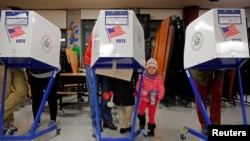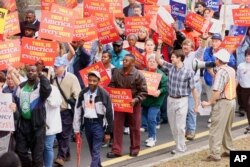U.S. President Donald Trump has said as many as 5 million non-citizens may have voted illegally and cost him the popular vote in the November election. He is calling for a “major investigation.”
The scope of the investigation has not yet been announced, but Trump tweeted he would look into “those registered to vote in two states, those who are illegal … even those registered to vote who are dead,” with an eye to strengthening the electoral process.
His comments have set off a flurry of debate among analysts on both sides of the political spectrum over whether the problem is widespread enough to warrant a costly investigation.
Non-citizen ballots
“It strikes me that he has the order reversed,” said Justin Levitt, a professor at the Loyola Law School in Los Angeles and an expert in constitutional law and the law of democracy. “I don’t have a lot of faith in investigations where the conclusions are announced first.”
Edward “Ned” Foley of Ohio State University’s Moritz College of Law, an expert in election law and author of Ballot Battles: The History of Disputed Elections in the United States, said he thinks the issue of non-citizen voting shouldn’t be a top priority for the Trump White House.
“Non-citizens are not allowed to vote, and any time a non-citizen actually does cast a ballot, that shouldn’t happen. But from everything we know already, the prevalence of that is extremely low, extraordinarily low.”
Studying the problem
As long as there have been U.S. elections, there have been allegations of voter fraud.
Back in 1792, Georgia lawmaker Anthony Wayne lost his seat in America’s second Congress after his opponent, James Jackson, alleged voter fraud. A careful recount of ballots in two Georgia counties showed more people voted in the 1790 election than were actually eligible to do so.
In recent times, the presidential election of 2000 saw Democrat Al Gore lose to Republican George W. Bush. In Florida, Bush won by only 1,784 votes, a margin so narrow that it triggered a recount in that state.
In going over the ballots, a number of irregularities were discovered. Machines had failed to count thousands of faulty ballots. More alarming, as many as 12,000 eligible voters, many of them African American, had been purged from voter rolls two years before the elections. This led to allegations of widespread disenfranchisement and denial of voting rights.
In 2002, the Justice Department launched its Voting Rights and Integrity Initiative, a rigorous, five-year investigation into the problem of voter fraud. Four years and untold millions of dollars later, the department reported it had convicted 86 individuals of ballot fraud, many of whom had simply misunderstood the rules.
Ricardo Knight, a Jamaican native and permanent resident living in Florida’s Miami-Dade County was one of those convicted. According to South Florida’s Sun Sentinel newspaper, he told immigration authorities in a citizenship interview later that he had voted in the 2000 election. He explained he had not known he wasn’t eligible to register and vote.
Loyola University’s Levitt studied allegations of individual voter fraud across the country in a variety of local, special, preliminary and general elections that took place between 2000 and 2014. He announced his findings in The Washington Post in 2014.
“I looked for any credible allegations that an individual had actually showed up at the polls and voted in somebody else’s name,” he said. “I found at the time only 31 credible allegations of in-person fraud at the polls, and, as I noted at the time, some of those might not have proved true.”
Hardly enough to sway a national election, he said.
Others find more examples
But Jason Snead, a policy analyst at the Heritage Center’s Edwin Meese III Center for Legal and Judicial Studies, believes the problem is far more prevalent.
“Heritage has already identified just in the last few years hundreds of cases and convictions where voter fraud has been proven beyond a reasonable doubt to have occurred and people have been found to be responsible for that,” he said. Heritage has posted an online sampling of 462 voter fraud cases, listed by state, which resulted in 742 criminal convictions, most of them over the past decade.
“We have seen where there are local cabals or widespread conspiracies that are designed to manipulate the election system or to keep people in office or get particular people elected. We certainly see vote buying operations, efforts to go around and, quote unquote, assist people in filling out their absentee ballots,” he said.
He cites many cases of individual voter fraud.
“And of course, this isn’t just non-citizens voting. It’s also felons who’ve had their voting rights taken away from them, this is people voting in multiple locations,” Snead said. “And I believe this is the tip of the iceberg.”
Many registrations no longer valid
A 2012 Pew Study found one out of every eight voter registrations to be either inaccurate or no longer valid. It also reported that 1.8 million registered voters are actually deceased and that 2.75 million Americans are registered in multiple states.
Most recently, the Public Interest Legal Foundation issued a report last September that fueled suspicions of widespread voting by non-citizens. Entitled “Alien Invasion in Virginia,” it reported that a sampling of eight out of 133 Virginia jurisdictions discovered that more than 1,046 non-U.S. citizens had registered to vote in 133 Virginia voting jurisdictions, which may explain why Trump has promised to pay particular attention to that state.
Further, the report states that “nearly 200 verified ballots were cast before they were removed from the rolls,” each one “likely a felony.”
But is that a valid assumption?
“Just because a ballot was cast that was invalid, which is a problem, doesn’t necessarily mean there was a conspiracy to commit voter fraud,” said Foley of Ohio State University’s Moritz College of Law. “Fraud is a pejorative term that implies intentional deception and manipulation, as opposed to there being mistakes in voter registration lists.”
People can move from state to state all the time, forgetting to take their names off the voter rolls in the states they leave, he explained, but that doesn’t mean they actually cast double ballots.
“As I understand the latest allegations, somewhere between 3 to 5 million improper ballots were cast this past November nationwide, which Trump claims accounts for why Hillary Clinton won the popular vote,” Foley said. “Even if there were 3 to 5 million invalid votes nationwide, we can’t jump to the conclusion that the election result was tainted, because we don’t know who they voted for.”
Foley doesn’t believe non-citizen voting is the biggest concern ahead of the next presidential election in 2020.
He thinks taxpayer dollars would be better spent looking at the vulnerability of the electoral system to cyberattacks by “malevolent actors.”
“Or trading in outdated, rickety, last-legged voting machines for something new,” he said.





